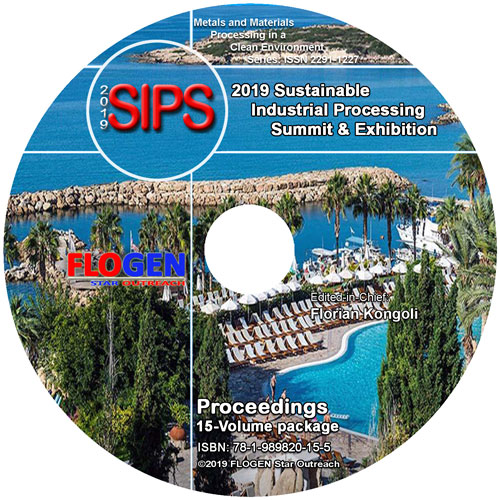2019-Sustainable Industrial Processing Summit
SIPS2019 Volume 3: Kobe Intl. Symp. / Science of Innovative and Sustainable Alloys and Magnets (SISAM)
| Editors: | F. Kongoli, M. Calin, J.M. Dubois, K. Zuzek-Rozman |
| Publisher: | Flogen Star OUTREACH |
| Publication Year: | 2019 |
| Pages: | 156 pages |
| ISBN: | 978-1-989820-02-5 |
| ISSN: | 2291-1227 (Metals and Materials Processing in a Clean Environment Series) |

CD shopping page
Magnetic Materials in the Current Global Environmental Issues
Jean-Marie Dubois1; Spomenka Kobe2;1INSTITUT JEAN LAMOUR, Nancy, France; 2JOSEF STEFAN INSTITUTE, Ljubljana, Slovenia;
Type of Paper: Plenary
Id Paper: 471
Topic: 42
Abstract:
Critical magnetic materials in the current global environmental issues have been one of the main research fields of Prof. Spomenka Kobe, who is being honored with the current symposium for her distinguished work and her lifetime achievements. These magnets, based on Nd-Fe-B alloys, are dominating the field already 36 years and their vital importance is nowadays mainly in e-mobility and e-energy power supply. Professor Kobe is the pioneer of modern magnetic materials in Slovenia. Over her career, she has achieved a number of breakthroughs in the area of these sustainable materials. The last to date is the reduction by a factor of at least 15 times less amount of heavy rare earth (HRE) needed to maintain high coercivity in engineered magnets with the largest possible magnetization, such as the ones used in wind generators or car engines. Nd-Fe-B magnets are at the forefront of sustainability. Due to the constant presence of possibly repeated restrictions on raw materials from the leading supplier, it is of vital importance to search for the ways how to avoid the next feasible crisis.
In August 2019, the Chinese government cut the resource tax on companies mining heavy rare earths to 20 percent from 27 percent, as part of its efforts to support the vital sector and maintain the country’s dominance. Millions of end of life (EoL) devices, especially the wind generators, are a great source of raw materials. The new frontiers in Europe are now focused on the recycling of magnetic materials from tens of thousands of those magnets. By using the latest technologies developed in Europe, we can use short-loop circular economy routes to re-integrate the metals into new products for the European market1.
The basic and applied research of the Magnetic Group (Department for Nanostructured Materials, Jožef Stefan Institute) in the field of Nd-Fe-B magnets, as well as possible alternatives, will also be briefly introduced and later on presented by the members of the group.